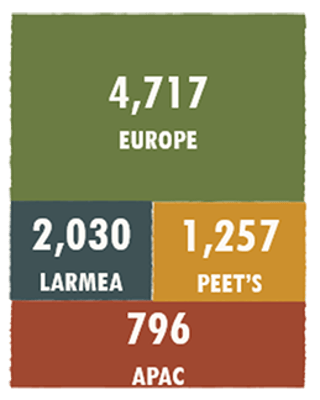One of our most material challenges is the responsible sourcing of coffee & tea, our two key raw materials, which are grown in countries that face significant socio-economic and environmental challenges. Common Grounds aims to address these challenges by identifying the main issues occurring along the entire supply chain, so that we can work with supply chain participants to develop solutions that ultimately lead to value creation for the company and our stakeholders.
We believe responsible sourcing is about understanding our supply chain and taking action to avoid and mitigate the risk of negative impacts when sourcing agricultural commodities. Our Responsible Sourcing Principles and our Supplier Code of Conduct address the key risks we have identified, such as working conditions, environmental practices, safety standards and human rights.
Our response through Common Grounds is to co-fund the development of resilient coffee cultivars and the promotion of regenerative agricultural practices, as well as investing in projects to build the capacities of smallholder farmers. We believe that training farmers in regenerative agriculture will lead to improved coffee yields and farmers' income, while helping to prevent deforestation. This will contribute to a sustainable coffee supply going forward, benefiting all of our stakeholders.
Also, further down the supply chain, in the production and packaging of our products, we manage the use of resources (“Minimising footprint” p108 in our 2024 Annual Report), limit the environmental impact and promote circularity (“Resource use circular economy” on p144 in our 2024 Annual Report).
More information can be found in the Sustainability section of our website and on p96 (Our sustainable supply chain) and p90 (Common Grounds) in our 2024 Annual Report.



